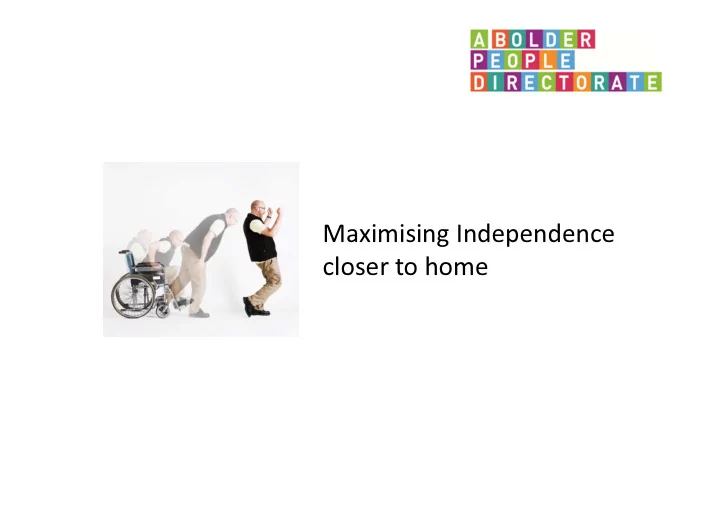

Maximising Independence closer to home
Background Challenges: • Coventry is a high user of residential care as a solution for adult social care & health needs. • Delayed transfers of care remain high in Coventry despite current levels of activity and attempts to mitigate. • The current system is not working as efficiently as it could. The Response: • A high level strategy for short term support to maximise independence launched in June 2014. It articulates the joint health and social care approach, and the work that will be implemented to address the key challenges.
Current system
Use of current services Aylesford Usage May – July 2014 • 26 people admitted to Aylesford between 23rd May - 16 July 2014 • Of the 26 people admitted 17 were originally admitted to University Hospital Coventry & Warwickshire following a 'Fall' • Of 26 admitted to Aylesford, 69% were referred to Aylesford as “not safe at night” • Other reasons include: - Previous discharge home with support that failed - 1 person needing stoma care as had arm in sling - Home environment unsuitable - High risk of falls - there were some referrals where no reason for referral was given
Use of current services Short Term Domiciliary Services • Between May 2014 and September 2014, 50 people left the service in week 1. • 7 people were fully independent and did not require support. • 19 people left within the first week due to not wanting the service or having family/carers that were willing to support. • 52% of people that left short term support within 1 week did not require the service. • Feedback from providers is that those exiting within a week could have gone home without short term support, whilst using telecare, as in most cases family were present to provide support or individuals did not want the service. • This is a significant number of hours of short term support that could have been availablefor people genuinely requiring domiciliary support
System Being Implemented Supporting at this level should Positive risk enablement approach to support people at the be only in exceptional circumstances Short term support in a residential or nursing setting Short term support in Housing With Care (inc’ Telecare) lowest level possible Short term domiciliary support (inc’ Telecare), voluntary sector support & informal support through family, carers & community, good information & advice Telecare, voluntary sector support & informal support through family, carers & community, good information & advice Voluntary sector support & informal support through family, carers & community, good information & advice Independent or with low level family support only Supporting at this level should be the aim wherever possible
Short term solutions Should Aylesford Close • 20 Nursing beds (10 step down & 10 assessment) • 21 short term residential care beds • 25 short term Housing With Care flats • 1350 hours of short term domiciliary support • Dementia discharge to assess service • Therapy and support provided by Coventry and Warwickshire Partnership Trust • Therapy and support provided by Coventry City Council • Integrated Community Equipment Service • Telecare • Practically Home (Age UK)
Costs of bed based short term support • Aylesford has a weekly cost per bed of £729 per week • Other City Council provided or commissioned short term bed costs range between £430 and £680 per week • A housing with care short term tenancy currently ranges between £276 and £320 per week
Coventry – Short term beds comparison Coventry – newly implemented system Coventry will have 25.5 per weighted 100,00 of population beds to provide short term support pathways where a bed-based placement is required in the newly implemented system. The mean nationally is 26.3 per weighted 100,000. Source: National Audit of Intermediate Care Report 2013 http://www.nhsbenchmarking.nhs.uk/CubeCore/.uploads/icsurvey/NAIC%202013/NAICNationalReport2013.pdf
Recommend
More recommend